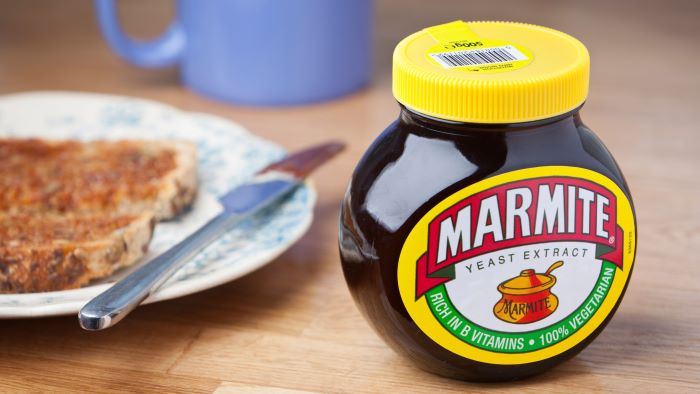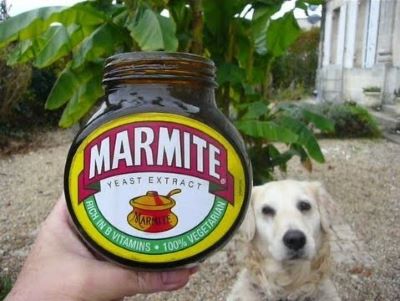Marmite, a dark and savory spread is a popular breakfast choice in many houses, thanks to its distinctive taste and umami-rich flavor. Whenever we are sitting around the food table, our furry friend may ask for a little treat.

But can dogs eat marmite? As responsible pet parents we must ensure the safety of our dogs, so let’s find out the unique flavor profile of marmite and its potential impact on dogs.🐶
What Is a Marmite?
Marmite is a dark, savory spread, extracted from yeast. It is popular for its distinct and robust flavor. Marmite is commonly used as a spread on bread, crackers, or toast, and it is a well-loved breakfast choice in many homes.
German scientist Justus von Liebig invented marmite during the late 19th century. It is made from by-products of beer brewing.

Marmite is rich in B vitamins including thiamin (B1), riboflavin (B2), niacin (B3), and folic acid (B9). Marmite should be stored in the dark and kept cool, but should not be refrigerated[1].
Can Dogs Eat Marmite?
Yes, dogs can technically eat Marmite because it doesn’t contain any toxic ingredients. But if your dog likes marmite then always feed them marmite in moderation, like a small treat for something once in a while.

Never let eating marmite become a daily habit as it is high in salt, also contains spices and additives. These ingredients may harm the digestive system of your dog. As a responsible pet parent, you should always prioritize the safety and well-being of your canine companion.
Some human foods like biscoff should only be fed occasionally as a treat. See our guide “can dogs eat biscoff” to learn about the possible effects of this treat.
Is Marmite Good or Bad for Dogs?
While small amounts of marmite may not immediately cause harm, the main concern is that marmite is high in salt content, as Dogs are more sensitive to Salt than humans are because they can’t efficiently eliminate it through their kidneys, so they have far less tolerance for it.
Dr. Jerry Klein from American Kennel Club suggests, “Although salt toxicosis is rare, it’s dangerous and potentially deadly. Salt toxicity typically occurs after a single significant dose of salt is ingested over a short period.” This is exactly why if you are feeding marmite to your dog then it should be in very small quantity only.

According to Dr. Sandra Mitchell from PetMD, “Sodium poisoning in dogs can lead to symptoms like vomiting, diarrhea, increased thirst, lethargy, tremors, and in severe cases, seizures or even death.”
So, if your dog enjoys that umami bite of marmite then always feed it in a small quantity or any other high-sodium food to dogs. And if your dog may eat a large amount of marmite someday then seek immediate vet’s guidance. A vet will provide you with proper guidance and steps to follow in case of a salt poisoning incident.
To measure the portion of marmite use a finger or a small spoon. You can also dilute it and then give it to your dog, remember to be cautious about the serving even if you dilute it.
Wondering how much dry food to feed your dog? Portion sizes vary based on your dog’s size, age, and activity level. Check out our guide on “how much dry food should i feed my dog” for serving size recommendations
Alternative Foods for Marmite
Opt for treats and foods specifically formulated for canine consumption to ensure their health and well-being. You can try different things that taste like Marmite or use them as spreads or sauces for your food:

- Vegemite: Vegemite is like Marmite. It is also a spread made from yeast. It tastes very salty and has umami. Umami is a taste that makes food yummy.
- Peanut Butter: Dogs and people both love peanut butter. It is a good spread for dogs instead of Marmite. But make sure it does not have xylitol.
- Hummus: Hummus is a blend of chickpeas, tahini, olive oil, lemon juice, and garlic, hummus can be a nutritious spread. Make sure to give your dog hummus that is not spicy or flavored.
- Pumpkin Puree: Dogs sometimes enjoy the mild sweet taste of pumpkin, you can make a puree and feed them.
When looking for healthy alternatives to Marmite for your dog, consider some of the best vegan dog food UK. These foods are formulated to provide all the nutrients your dog needs without any animal products

- Cheese or Yogurt: Cottage cheese or Yogurt can be a good alternative as it is high in protein and creamy to satisfy the fancy side of the tongue.
- Cooked chicken: Cooked plain chicken without seasoning can be a high-in-protein and fulfilling alternative.
- Fruits: Apples, Watermelon, and blueberries can be a refreshing and minerals-rich alternative.
- Veggies: Sweet potatoes, Green beans, and Carrots can be an excellent alternative as they are rich in vitamins and fiber.
Some other human foods like wine gums should be avoided. Check out our guide “can dogs have wine gums” to learn more about the risks of feeding gummy candy to dogs
FAQs
What Spreads Can Dogs Eat?
Peanut butter is safe for most dogs to eat. It’s a great healthy treat–peanut butter can be a superb source of healthy fats, vitamins, and well-needed protein for dogs of all ages. However, it’s important to make sure your dog doesn’t overdo it with peanut butter.
Can Dogs Eat Butter?
Butter isn’t toxic to dogs, but it is bad for them. Eating treats and snacks that contain butter can hurt your dog’s health and cause serious problems like pancreatitis. Certain fats and oils, such as omega-3 and omega-6 fatty acids, can help your dog’s skin and coat health.
Can Dogs Eat Honey?
Yes, you can feed honey to your dog. It’s sweet, filled with antioxidants, provides the benefits of several vitamins and minerals, provides relief from allergies and skin irritations, and gives your dog a quick energy boost when they need it. Raw honey is beneficial for most adult dogs, with few risks.
Can Dogs Eat Marmite on Toast?
Marmite contains a high level of salt amounting to almost 11% by volume. This alone makes it unsuitable as a food product for dogs. Toast is acceptable for dogs, but the ingredients in the jam must be of the same kind that they are. It is critical to remove any toxic substances from the jar, such as Xylitol so that dogs can consume it. It is acceptable for most dogs to eat a splodge of jam on their toast and be in good health.
Can Dogs Eat Marmite or Bovril?
It is not safe for dogs to have Bovril. Bovril is high in sodium and contains MSG, both of which can be dangerous for dogs. Bovril also contains onions, which are toxic to dogs.
Can Dogs Eat Tomatoes?
Dogs can eat tomatoes in moderation, but only ripe ones. Don’t offer your dog tomatoes in large quantities or frequently and make sure to avoid feeding them green tomatoes as they contain substances that can be harmful to them. Do not feed them chocolate, or almonds. Also, onions and garlic could be toxic for some.
Summary
In conclusion, Our canine companions may enjoy the umami and unique bite of marmite but we as pet parents must feed them what is healthy and right for their nutritional needs.
There are plenty of delights for our dogs to enjoy, you may try the alternatives suggested above, as they will add many benefits and extra taste to your dog’s daily diet.
Remember the best way to make our dogs happy is by feeding them healthy food. So, next time they ask you for the marmite treat then give them in a small quantity while you save this savory and sweet moment with your furry friend!🐶🐾
If you are considering switching your puppy to a raw food diet, be sure to educate yourself on proper amounts. Refer to our guide on how much raw food to feed puppy to learn how to calculate the right raw food quantities for your growing pup.
There are many healthy and tasty alternatives you can try for your dog, like peanut butter, veggies, or even plain ice cubes. But are ice cubes bad for dogs?
Reference:
- Wikipedia contributors. (2023). Marmite- Wikipedia.



